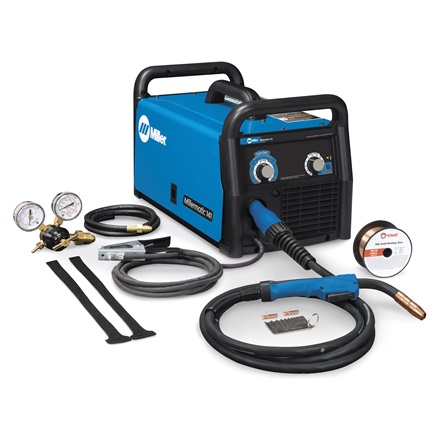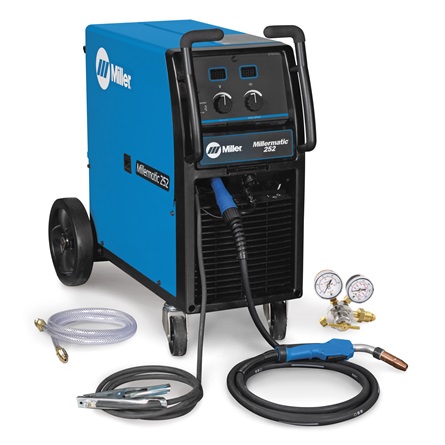Miller vs Lincoln Electric are two top contenders if you’re in the market for high-quality welding machines. Both have long histories of manufacturing reliable products. However, specific differences can make one brand more suitable for you than the other.
| Criteria | Miller Electric | Lincoln Electric |
|---|---|---|
| Construction Quality | 9.0 | 8.5 |
| Value for Money | 8.5 | 8.5 |
| Customer Service | 8.0 | 8.5 |
| Product Range | 9.0 | 9.0 |
| Weld Quality | 9.0 | 8.5 |
| Overall Score | 8.7 | 8.6 |
Table of Contents
Miller Electric

Overview
Miller Electric is a go-to brand for many professionals and hobbyists. It’s renowned for innovative technology and high-quality welding equipment. From Miller welders to cutting machines, they offer an extensive range of products designed to enhance efficiency and ease of use.
History
Established in 1929, Miller has a deep-rooted history in the welding industry. Initially a one-man operation, it has grown to become a global leader in the design and manufacturing of arc welding products. Its commitment to innovation can be seen in its extensive product line and focus on improving welding performance.
Reputation
Miller Electric is highly respected in the welding community. The brand’s durability, power, and innovation reputation is largely undisputed. I’ve used Miller welders in my personal and professional projects and have always been impressed with their performance and reliability. Whether you’re a hobbyist or a pro, Miller’s robustness and reliability are incredibly appealing.
Product Range
Miller offers a vast product range, including MIG (Metal Inert Gas), TIG (Tungsten Inert Gas), and stick welders. The company also provides plasma cutting machines and various other welding accessories. One of their popular products is the Miller 211, a versatile and easy-to-use MIG welder I’ve used in many projects. Whether you’re welding aluminum, steel, or other metals, Miller has a solution for you.
Lincoln Electric

Overview
Lincoln Electric, another giant in the welding industry, is known for producing top-tier welding machines and equipment. Their products range from Lincoln welders to cutting equipment, all designed with professional standards.
History
Founded way back in 1895, Lincoln Electric’s journey has been marked by technological advancements and innovations. Over the years, they have upheld their reputation for producing high-quality, durable welding machines, including the Lincoln Weld Pak and the Lincoln 180.
Reputation
Lincoln Electric has a strong reputation for reliability and efficiency. My experience with Lincoln welders has been positive, with their machines consistently delivering quality welds. Thanks to its dedication to performance, reliability, and user-friendly interfaces, this brand appeals to professionals and beginners alike.
Product Range
Lincoln Electric’s product lineup includes MIG, TIG, stick, multi-process welders, plasma cutting machines, and various welding accessories. Their product range is as diverse as Miller’s, offering solutions for different welding needs. The Lincoln 211i, for example, is a versatile welder that can easily handle different materials.
Construction Quality
Miller Electric and Lincoln Electric are both known for their solid construction quality. These brands are trusted by professionals worldwide due to their machines’ durability and robustness.
However, in my experience, Miller has a slight edge regarding construction quality. Their machines often feature thicker metal housing and more rugged internal components, designed to withstand demanding environments. This makes them ideal for professionals requiring equipment that can handle intense and sustained use.
Value for Money
In terms of value for money, both brands offer impressive returns on investment. Miller and Lincoln machines are long-lasting and maintain their performance levels over time. However, they vary in price, with some Miller models tending to be slightly pricier than their Lincoln counterparts.
That being said, the slightly higher price is justified when considering the innovative features and superior construction quality that Miller offers. Still, Lincoln also provides excellent value for money, especially for beginners or hobbyists who may not require the heavy-duty features of some Miller models.
Customer Service
Customer service is essential to any brand, and both Miller and Lincoln take this seriously. However, based on customer reviews and my personal experiences, Lincoln’s customer service is a bit more responsive and helpful. They are prompt to respond to customer queries and go out of their way to resolve issues.
Product Range
Both Miller and Lincoln have various products to cater to various welding needs. They offer MIG, TIG, and Stick welders, plasma cutters, multi-process machines, and various accessories.
Miller often stands out for its cutting-edge technology, offering more advanced features on some models. On the other hand, Lincoln has an extensive product range known for its accessibility and user-friendly design.
Both brands cover many applications, from DIY home use to heavy industrial operations.
Weld Quality
When it comes to weld quality, both Miller and Lincoln deliver outstanding results. However, many professionals and myself included have found that Miller machines sometimes offer slightly superior weld quality.
The arc stability, smoothness, and power of Miller welders can result in cleaner, more consistent welds. Lincoln machines also produce excellent welds, but some models may not match the top-of-the-line Miller machines in terms of absolute performance.
Miller Bobcat vs Lincoln Ranger
When comparing the Miller Bobcat and Lincoln Ranger, two popular engine-driven welders, it’s worth noting that both are highly regarded. The Bobcat is renowned for its power, durability, and excellent performance in harsh environments.
On the other hand, the Ranger stands out for its reliability, versatile application, and power efficiency. Personally, I’ve used both, and while they’re very close, the Bobcat’s durability gave it an edge in my books.
Millermatic 141 vs Lincoln 140
The Millermatic 141 and Lincoln 140 are both exceptional MIG welders, suitable for light industrial applications and hobbyist use. The 141 offers excellent power output, is easy to set up, and provides smooth, spatter-free starts.
Conversely, the Lincoln 140 stands out with its Diamond Core Technology for great arc performance. I’ve enjoyed using both, but the spatter-free starts of the Millermatic 141 always feel like a boon.
Miller 215 vs Lincoln 215
Comparing multi-process welders, the Miller 215 and Lincoln 215 are both reliable options. The Miller 215 impresses with its Auto-Set feature, which makes setting up a breeze.
However, the Lincoln 215’s robust design and seamless switch between processes provide great convenience. As someone who values convenience, I slightly prefer the Lincoln 215.
Miller 211 vs Lincoln 211i
The Miller 211 and Lincoln 211i are versatile MIG welders, perfect for various tasks. While the Miller 211 offers superior arc performance, the Lincoln 211i stands out with its user-friendly interface and Power MIG feature for great arc performance.
After using both, I can say the Miller 211’s superior arc performance is a real standout feature.
Miller 252 vs Lincoln 256
The Miller 252 and Lincoln 256 are robust MIG welders designed for heavy-duty applications. While both have their strengths, the Miller 252’s superior power output and Auto-Set feature give it an edge in my experience.
However, the Lincoln 256’s robust design and ease of use make it a worthy competitor.
Conclusion
Choosing between Miller vs Lincoln welding machines is no easy task. Both brands offer high-quality, reliable products. However, the best choice depends on your specific needs and preferences. My experiences with both brands have been positive, and the differences are often nuanced.
Take the time to consider what features are most important to you. Whether you value power, ease of use, robust design, or innovative technology, both Miller and Lincoln have plenty to offer.





